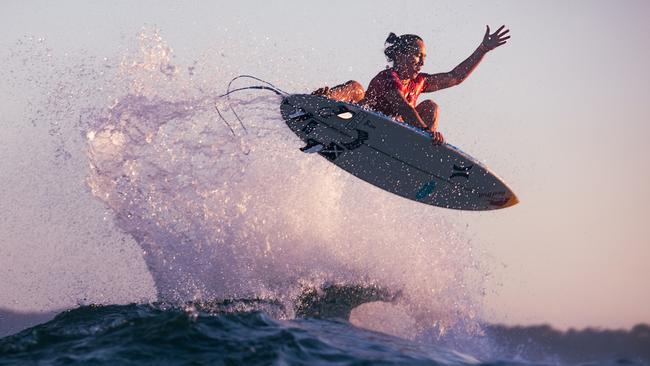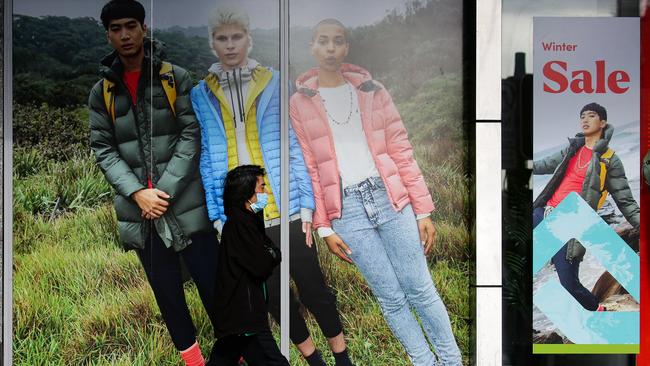Kathmandu has booked stronger profits for 2021
The Kathmandu boss is tipping a wave of pent-up spending in stores as consumers are released from lockdowns before Christmas.

The chief executive of Kathmandu, Michael Daly, is tipping a wave of “revenge spending” at his stores as consumers are released from home lockdowns before Christmas and spend up on everything from tents and camping gear to puffy jackets and boots to enjoy the great outdoors again.
Mr Daly said Kathmandu, which issued its full-year results on Tuesday showing strong results from its surfing brand Rip Curl and hiking boots outfitter Oboz, had high expectations for Christmas.
“In terms of our history and what we have seen in the past is that when lockdowns open up quite often there can be a bit of a bounce, revenge spending, or whatever they are calling it these days … just getting back to normal life and enjoying holidays, enjoying camping and getting out in the outdoors,” he said.
“And obviously people have been stuck at home, not able to go shopping in person and not able to do the activities that they enjoy doing and therefore hadn’t had the need for the products. And obviously once they start doing those (outdoor) activities they might have that need.”
Pent-up spending unleashed by consumers was evident in other parts of the Kathmandu business, particularly in opened up economies across the United States and Europe which had triggered a revival of camping, surfing and beach holidays.
Mr Daly said the return of beach holidays had helped bolster profits for Rip Curl but this was countered by falling sales and earnings at the Kathmandu retail chain as key markets across Australia and New Zealand were in lockdown and put a damper on spending for tents, camping gear and camping apparel.
This strong divergence in the performance of the retailer’s three arms did not however put a cap on group profitability with Kathmandu on Tuesday reporting that total profits had risen to $NZ63.4 million ($A61.5m) for fiscal 2021, up strongly from the $NZ8.868m posted in 2020 when Covid-19, lockdowns and the closure of international borders slashed profits by 85 per cent.
The retailer did warn that due to continued lockdowns and other restrictions caused by Covid-19 its sales since September had suffered and that it was expecting first half fiscal 222 profit to be below the first half of 2021.
Kathmandu also revealed that like many other retailers it had been hurt by supply constraints, disruptions to its supply chain and the escalating costs of freight and shipping costs.
Leisure activities, outdoor recreation and other recreational pursuits looked to have been impacted in different ways by Covid-19 through fiscal 2021, as lockdowns and the closure of international borders delivered a mixed result for the company.
Its global surfwear brand Rip Curl booked a 55.3 per cent lift in sales to $NZ490.4m and a 1252.4 per cent surge in earnings before interest and tax to $NZ56.9m, underpinned by growth in surfing activity.

But the flagship Kathmandu retail arm suffered greatly from Covid-19 restrictions on movement and store closures with its sales falling 17 per cent to $NZ354m and EBIT plummeting by 48.8 per cent to $NZ26.3m.
The Oboz footwear business, bolstered by a strong uplift in hiking participation by consumers, posted a 44.9 per cent lift in sales to $NZ78.4m as EBIT rose 72.6 per cent to $NZ11.4m.
Kathmandu reported that group sales for the 12 months to July 31, were up 15.1 per cent to $NZ922.8m which was below guidance of around $NZ930m.
Underlying EBITDA was up 35.9 per cent to $NZ113.3m, driven by strong sales performance and focused management of operating expenses. Guidance in June was for earnings of around $NZ120m.
Kathmandu received government grants such as JobKeeper, other wages subsidies and government payments of $NZ29.165m for 2021 against $NZ27.369m in 2020.
The company said the business was impacted by Covid-19 related travel restrictions but it had strong forward order books for Rip Curl and its footwear brand Oboz that were above pre-Covid levels.
A final dividend of 3 NZ cents per share (fully franked for Australian shareholders) was declared, payable on December 15, to bring total 2021 dividends to 5 NZ cents per share. No final dividend was paid last year.
“Rip Curl achieved sales above pre-Covid levels in the key regions of North America and Europe during the Northern Hemisphere summer season, benefiting from increased participation in surfing, and reflecting the brand’s technical product focus and strong consumer engagement,” said CEO Mr Daly.
“Rip Curl’s wholesale order books are now significantly above pre-Covid levels.”
He said while Kathmandu had felt the impacts of Covid related travel restrictions, he was pleased with the early momentum following the brand relaunch in May 2021.
“This relaunch will build on strong brand fundamentals and position Kathmandu to grow to a truly global brand.
“Oboz continues its strong performance, with sales growth reflecting the successful product innovation strategy and diversification of its customer base. The forward order book is at its highest level ever, allowing investment to support future growth.”
In terms of the trading outlook, same store sales for the six full weeks to September 12 were significantly impacted by ongoing Australasian Covid lockdowns as follows.
Rip Curl saw its sales fall 12.8 per cent for the period and Kathmandu sales down 19.9 per cent.
Kathmandu sales in regions less affected by Covid restrictions performed strongly.
Rip Curl and Oboz wholesale order books are now significantly above pre-Covid levels, the company said. In addition to ongoing Australasian lockdowns, Covid restrictions are also impacting the group’s supply chain. Suppliers have reduced factory capacity due to enforced closures, and freight congestion is leading to delivery delays and increased freight costs.
Shares in Kathmandu ended down 2 cents at $1.41.



